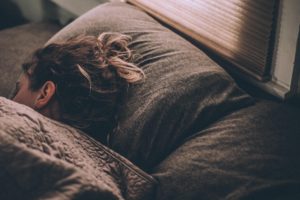Getting enough sleep each night is imperative … not only to how we perform the next day, but also to our mental, physical, and emotional well- being. But what happens when you go to bed at night, and the next morning your partner tells you that your snoring kept them up – or you’ve woken your own self up from snoring so loudly? Its something we often joke about, but there are serious medical complications that come along with snoring.
being. But what happens when you go to bed at night, and the next morning your partner tells you that your snoring kept them up – or you’ve woken your own self up from snoring so loudly? Its something we often joke about, but there are serious medical complications that come along with snoring.
When you snore, you are essentially stopping the breath from flowing freely as it should. Otherwise known as sleep apnea, the typical symptoms include things like gasping for air while you are sleeping, waking up with a dry mouth, being overly tired during the day, snoring loudly, and periods of time during sleep when you actually aren’t breathing at all – which would be noticed by someone else.
With approximately 22 million Americans that are currently suffering from sleep apnea, it’s vital to know what causes it, and how we can treat it effectively. There are three different types of sleep apnea that are able to be diagnosed, but the most common is called obstructive sleep apnea, or OSA. This type of sleep apnea occurs when the muscles in the throat are relaxed, which then narrows the airway; when this happens, your body realizes that you aren’t getting enough air, and awakens you so that you can breathe – happening so quickly, that typically you don’t even remember it.
This correlates directly with allergies, which affects even more people than sleep apnea does. With over 24 million people in the United States that are affected by some sort of allergy, it makes sense that there might be a connection between the two conditions. When someone is allergic to a substance (mold, dust, and pet dander are a few of the more common irritants) and breathes them in through the nose and mouth, the nasal passages can become irritated and inflamed.
One study in particular found that quality of sleep is drastically reduced by signs related to allergies, and can lead to the same symptoms that one would find with sleep apnea; when there is congestion and irritation in the nasal passages, it narrows the airway – just like with snoring. This isn’t only a problem in the adult population though; research has shown us a link between allergies and sleep apnea in children as well.
If you know that you have sleep apnea, what can you do to treat it? If it’s a mild case, your local PCP might suggest that you try simple remedies first, like quitting smoking (if you’re a current smoker), or getting more exercise into your daily routine. If your snoring is linked to allergies, they might also prescribe you treatment to effectively handle your allergic reactions.
Other treatment options include using a CPAP machine, which essentially gives you oxygen through a mask while you sleep; other options include oral appliances to help keep your airway open. If you’d like to try the self-care route in caring for your sleep apnea, try and reduce or eliminate alcohol before bed, make sure to get in a good exercise routine, don’t smoke, and sleep on your side if at all possible.
Guest Blogger: Krista Harper
